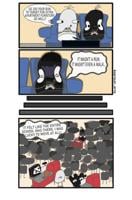One reason why I voted for Melanie Flowers and McKenzy Heavlin for student body president and vice president is because of their innovative approach to counseling. Their "embedded" counseling system proposes to hire new counselors who would serve under different colleges, leading to a more individualized approach for smaller student populations.
The specifics of this plan are foggy; where Flowers and Heavlin suggest colleges find the money to pay for this new service is a primary obstacle. However, in a recent column, Technician writer Skye Sarac expressed a number of assumptions and misconceptions about this idea which could lead students to believe it doesn't have incredible potential.
As someone who is not privy to the exact details of Flowers and Heavlin's plan, I can't say with absolute certainty that their plan will work perfectly — and one point of concern is their apparent lack of foresight, which Technician identified following the Student Media SBP/SBVP debates back in February. However, I believe their idea could be hugely beneficial for many students if executed properly.
Sarac writes that the plan forces counselors to become advisers, which is strictly untrue. Existing advising services, under the plan, would not be going anywhere, nor would embedded counselors have the power to rearrange schedules, lift advising holds or keep records of students' credit hours and grades.
She does bring up a valid point, however, that most counselors will not have been trained in the discipline they will be working with, whereas most advisers are. However, this is exactly why existing services must remain in place — so students will have the options of going to their adviser for academic concerns or counselor for mental health ones. The fact of the matter is that currently, students have issues with both, which are inherently tied.
Counselors at the Counseling Center do not have college-specific training, either. Embedded counseling services would allow the hiring process to tailor the counselor to the college, leading to more individualized care. The goal of embedded counseling is not to replace anything, but to provide a resource students don't currently have, which is a mental health expert who specializes in the problems each college tends to present.
Counseling Center counselors may be equipped to deal with a wide variety of issues, but they don't have nuanced perspectives on the inner workings of individual departments. Engineering students may be stressed about picking a major to CODA into, whereas CHASS students may struggle with life plans after college in a world which severely undervalues the humanities and arts. University College students may have issues adjusting to being away from home, and students of any major can begin to question whether they've picked the right field of study.
These are issues which straddle the line between academic and mental health. A student who approaches the Counseling Center with problems like these might be referred to their adviser, only to have their adviser refer them back to the Counseling Center. Students need counselors who cater to the needs of each college to address this negative feedback loop.
Sarac argues that embedded counseling would "negatively benefit" students by "decentralizing" the Counseling Center, then praises the center's existing efforts to extend its reach by offering weekly drop-in sessions in different spaces such as Multicultural Student Affairs and the GLBT Center. Embedded counseling would only be an extension of these efforts; current drop-in spaces are tailored to the needs of different groups, such as women of color or those who are grieving. Providing counselors familiar with the unique challenges presented by each college would just grant students another resource designed for their individual experiences.
As Sarac points out, the current advising system does have its issues; for example, many advisers are also professors and often don't have time to spend on students during some of the most crucial moments in their academic careers. Embedded counseling services don't solve this problem, but they're not meant to. They are built to address a much larger issue; the Counseling Center is simply incapable of providing one-on-one sessions for all the students who need help on campus.
The Counseling Center is so overcrowded that it offers group workshops as alternatives to one-on-one sessions, recruits students to do outreach, and even provides therapy through an online program. It's time to stop pretending that it can effectively support NC State's entire population of 36,000 students through one of the most stressful periods of their entire lives all on its own.
When I broke down crying in the middle of an advising session last semester, my adviser suggested I see the Counseling Center — but she had already done more for my mental health just by being a sympathetic ear and helpful resource than any counselor who wouldn't understand the particulars of my situation or even be able to make time for me. Sarac writes "students are expected to reach out to the Counseling Center when they need help … instead of the other way around," but this is just victim blaming for students like me who don't feel welcome or comfortable adding to the burden of an already flooded system.
Just because the Counseling Center works for you doesn't mean it's for everybody, and it especially doesn't give you the right to advocate against an expansion of mental health resources for an underserved population. As humans, it is our responsibility to recognize one another's individual needs and do our best to provide for them even if they don’t apply to us. That's the entire point of therapy in the first place.




(0) comments
Welcome to the discussion.
Log In
Keep it Clean. Please avoid obscene, vulgar, lewd, racist or sexually-oriented language.
PLEASE TURN OFF YOUR CAPS LOCK.
Don't Threaten. Threats of harming another person will not be tolerated.
Be Truthful. Don't knowingly lie about anyone or anything.
Be Nice. No racism, sexism or any sort of -ism that is degrading to another person.
Be Proactive. Use the 'Report' link on each comment to let us know of abusive posts.
Share with Us. We'd love to hear eyewitness accounts, the history behind an article.